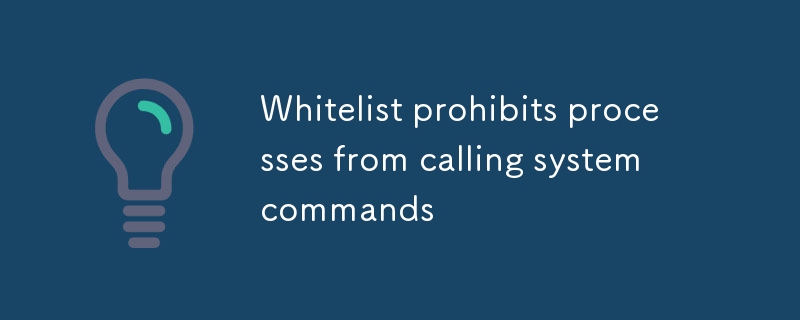
This article discusses how to whitelist forbidden processes from calling system commands. Whitelisting forbidden processes helps prevent unauthorized access to sensitive system commands, reducing security breaches and data leaks. The article provides

Whitelist Forbidden Processes from Calling System Commands
How to whitelist forbidden processes from calling system commands?
To whitelist forbidden processes from calling system commands, you can use theauditdtool to create a rule that allows specific processes to execute certain commands. Here's how you can do it:auditdtool to create a rule that allows specific processes to execute certain commands. Here's how you can do it:
/etc/audit/rules.d/whitelist.ruleswith the following content:-w /usr/bin/command -p x -c neverIn this rule,/usr/bin/commandis the command that you want to whitelist,-p xspecifies that the rule applies to processes with executable permission, and-c neverspecifies that the rule should never be enforced. You can add multiple rules to the file, each on a separate line.
auditdsystem by running the following command:sudo auditctl -R /etc/audit/rules.d/whitelist.rulesauditd:To ensure that the rules are applied immediately, restartauditdby running:sudo systemctl restart auditdWhat are the benefits of whitelisting forbidden processes?
Whitelisting forbidden processes can help prevent unauthorized access to sensitive system commands. By restricting the ability of certain processes to execute specific commands, you can reduce the risk of security breaches and data leaks.
What are some examples of forbidden processes?
Forbidden processes are typically processes that are not essential for the operation of the system and that could be used to compromise the system if they were allowed to execute certain commands. Examples of forbidden processes include:
How can I audit forbidden processes?
You can audit forbidden processes by using theauditctltool. To do this, run the following command:
sudo auditctl -w /usr/bin/command -p x -c idThis command will create an audit rule that logs all attempts by processes with executable permission to execute the/usr/bin/command
/etc/audit/rules.d/whitelist.ruleswith the following content:sudo cat /var/log/audit/audit.log | grep /usr/bin/command/usr/bin/commandis the command that you want to whitelist,
-p xspecifies that the rule applies to processes with executable permission, and
-c neverspecifies that the rule should never be enforced. You can add multiple rules to the file, each on a separate line.
auditdsystem by running the following command:auditd: To ensure that the rules are applied immediately, restartauditdby running:auditctltool. To do this, run the following command:rrreeeThis command will create an audit rule that logs all attempts by processes with executable permission to execute the
/usr/bin/commandcommand. You can view the audit logs by running the following command:rrreee
The above is the detailed content of Whitelist prohibits processes from calling system commands. For more information, please follow other related articles on the PHP Chinese website!




